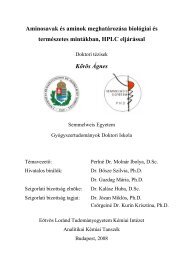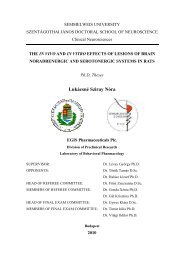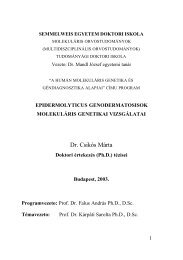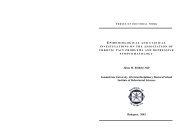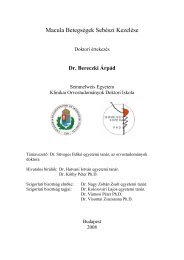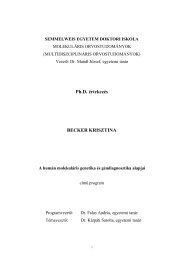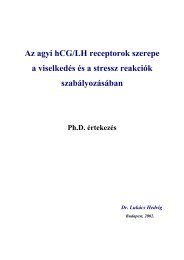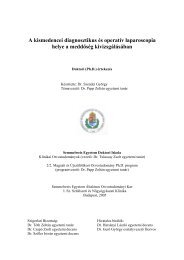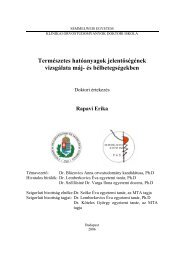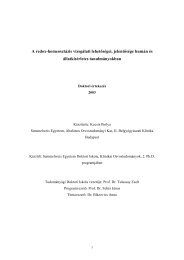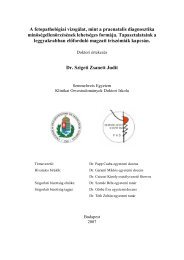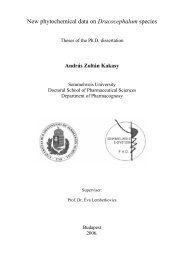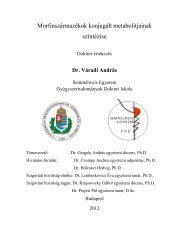értekezés - Semmelweis Egyetem Doktori Iskola
értekezés - Semmelweis Egyetem Doktori Iskola
értekezés - Semmelweis Egyetem Doktori Iskola
You also want an ePaper? Increase the reach of your titles
YUMPU automatically turns print PDFs into web optimized ePapers that Google loves.
Summary<br />
Natriuretic peptide levels are good markers of cardiovascular diseases and<br />
ventricular function. NT-proXNP, a new virtual natriuretic peptide analyte, incorporates<br />
information about the levels of both N-terminal pro-atrial and pro-brain natriuretic<br />
peptides (NT-proANP, NT-proBNP). We aimed to investigate the clinical applicability<br />
of NT-proXNP in neonates and infants undergoing open heart surgery. We also aimed<br />
to elucidate the associations of natriuretic peptide levels and postoperative<br />
hemodynamic parameters in this population.<br />
After approval of the institutional review board and parental informed consent,<br />
we enrolled 30 children under the age of 1 year into this prospective study. All patients<br />
underwent elective cardiac operation with cardiopulmonary bypass to achieve complete<br />
biventricular repair. Hemodynamic parameters assessed by transpulmonary<br />
thermodilution and natriuretic peptide levels were recorded preoperatively,<br />
postoperatively and 12, 24, 48 and 72 hours after the arrival at the intensive care unit.<br />
Clinical and laboratory values were analyzed in the first 48 hours following surgery.<br />
The new NT-proXNP immunoassay was sensitive to the activations of both<br />
NT-proANP and NT-proBNP. NT-proXNP and the other natriuretic peptide levels had<br />
strong inverse correlations with cardiac index (CI) and stroke volume index throughout<br />
the postoperative period. There were also correlations between natriuretic peptide levels<br />
and systemic vascular resistance, extravascular lung water and other hemodynamic<br />
parameters, respectively. Conventionally measured parameters such as heart rate, mean<br />
arterial pressure and pulse-pressure product exhibited weaker correlations with CI than<br />
natriuretic peptide levels. Clinical and laboratory values, except for creatinine levels,<br />
showed no correlation with CI. Postoperative NT-proBNP and NT-proXNP levels had<br />
good diagnostic and prognostic performance in ROC analysis for low output syndrome<br />
and mechanical ventilation longer than 72 hours.<br />
NT-proXNP and the natriuretic peptide levels are reliable indicators of the<br />
circulatory state and they are useful for the follow up of neonates and infants after open<br />
heart surgery. Elevated postoperative NT-proBNP and NT-proXNP levels are good<br />
markers of low cardiac output and might be applicable for the prediction of<br />
complications following surgery.<br />
87



